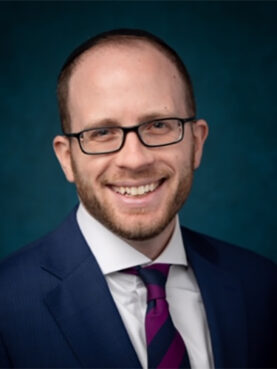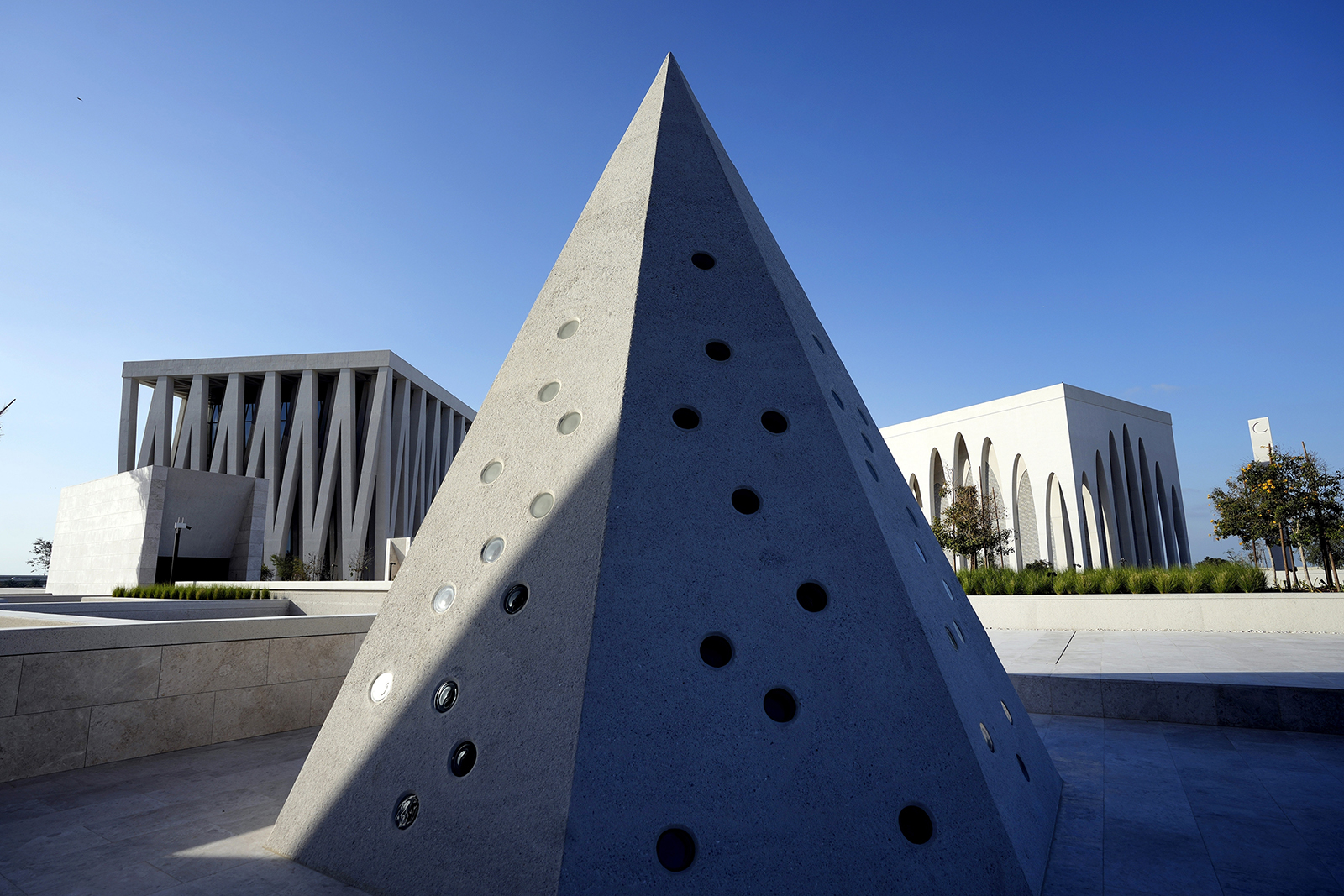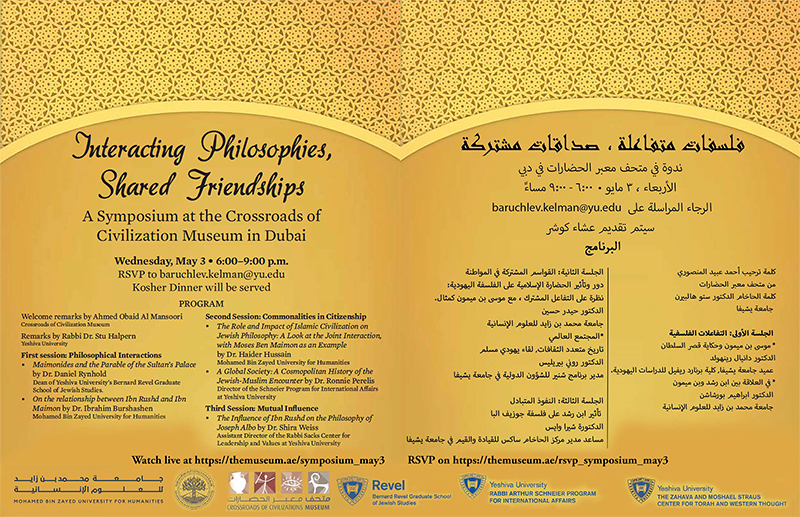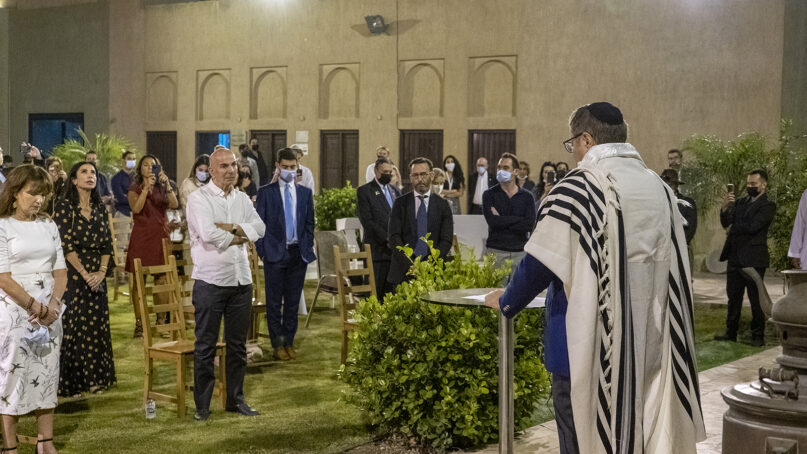(RNS) — In April 2021, around Yom HaShoah, Israel’s Holocaust Remembrance Day, the Muslim founder of a museum in the Persian Gulf nation of United Arab Emirates welcomed a small contingent from a flagship U.S. Jewish Orthodox university. The school’s president would be giving a keynote address at the first Holocaust commemoration in an Arab country, and before the event the group of Jewish scholars was invited to view a letter from Theodor Herzl, the father of modern political Zionism. On the museum’s doorpost, the visitors noted, was a mezuzah.
“When I was recounting the story to my parents,” said Rabbi Stuart Halpern, “they said, ‘Was the Messiah right behind you? Who can imagine that we would live to see such a day?'”
The unexpected welcome eventually led to a historic conference that will take place at the same “Crossroads of Civilizations” museum in Dubai on Wednesday (May 3). Yeshiva University in New York and the Mohamed Bin Zayed University for Humanities in Abu Dhabi are joining for the first “Interacting Philosophies, Shared Friendships” conference on the mutual influences of Islam and Judaism, with a focus on medieval scholar and physician Moses Maimonides.
“In light of a complex, to say the least, historical relationship, for a millennium and a half or so, between Judaism and Islam, to have these kinds of joint initiatives is tremendous,” said Halpern, senior adviser to the provost and deputy director of the Straus Center at Yeshiva University.

Rabbi Stuart Halpern. Courtesy photo
Halpern coordinated the conference with Ahmed Almansoori, a businessman, former government official and the founder of the museum, which hosts the only permanent Holocaust exhibit in an Arab country.
Five students from Yeshiva’s Stern College for women — selected for their academic achievements in religion, philosophy and politics — will join three YU faculty members and two scholars and roughly a dozen students from Bin Zayed University. The first day of academic sessions will wrap up with a kosher dinner. On day two, the YU contingent will take a quick jaunt to Abu Dhabi, UAE’s capital, for a tour of the recently opened Abrahamic Family House, which hosts a mosque, church and synagogue, and attend an Israel Independence Day celebration at the Israeli Embassy.
“The fact that these partnerships are happening and involving the Israeli Embassy is noteworthy just because this wasn’t possible 10 years ago. The governments didn’t have relationships,” said Knox Thames, a visiting expert at the U.S. Institute of Peace and former State Department special adviser for religious minorities in the Middle East and South/Central Asia.
The efforts to span Jewish-Muslim divides through scholarship are just the latest examples of interreligious scaffolding cropping up in the UAE. According to Thames, peacemaking started in earnest with the Abraham Accords brokered by the Trump administration in 2020, which began the process of normalizing diplomatic relations between Israel and the UAE, Bahrain and other Arab countries.
“It really sort of opened up the floodgates and engagement between Israel and the UAE,” Thames said, citing the new direct flights added between the two countries; an American Jewish Committee center in Abu Dhabi, founded in 2021; and a new center for regional coexistence announced by the UAE and Anti-Defamation League in March.

A general view of the Abrahamic Family House with the Moses Ben Maimon Synagogue, left, and the Imam al-Tayeb Mosque, right, in Abu Dhabi, United Arab Emirates, Feb. 21, 2023. A new complex, called the Abrahamic Family House, erected on the shores of the Persian Gulf, in the capital of the United Arab Emirates, houses a Catholic church, a Jewish synagogue and an Islamic mosque. (AP Photo/Kamran Jebreili)
The Abrahamic Family House, which contains the first synagogue constructed in the region at government expense since the 1930s, opened in February alongside an influx in kosher restaurants to serve the growing Jewish population.
“It’s a continuation of UAE finding innovative ways to engage with the global Jewish community either through direct engagement with Israel or with communities in the United States and Europe,” said Thames. “They’ve been blazing a path that other countries are beginning to follow in the Arab world.”
The UAE’s efforts to embrace Jewish groups from around the globe come at an auspicious time for YU, which is extending the scholarly reach of its graduate schools. Though Halpern says there aren’t any current plans for a YU satellite campus there, the school is open to exploring future possibilities for collaboration such as shared library resources, visiting faculty and students, or potentially bringing the YU museum’s current Maimonides exhibition to the UAE.

A flyer for the “Interacting Philosophies, Shared Friendships” conference, printed in English and Arabic. Courtesy image
Maimonides might be seen as a curious figure on which to found Muslim-Jewish friendship, as Halpern pointed out: The legendary scholar “was forced to flee various times throughout his life from Muslim persecution,” he said. But Maimonides owed a debt to Islamic thinkers of his day, whom he regularly cited in his writings. In recognition of this, conference topics will include “The Role and Impact of Islamic Civilization on Jewish Philosophy, with Maimonides as an Example,” by MBZUH’s Haider Hussain, and “Maimonides and the Parable of the Sultan’s Palace,” by YU graduate school dean Daniel Rynhold.
Halpern added that rising political leaders in the UAE have indicated a hunger for Jewish scholarship, one he says YU is more than qualified to satisfy.
“This is a new page of history that we’re turning, and we’re very excited to be not only part of that book, but hopefully one of the page turners,” said Halpern.





